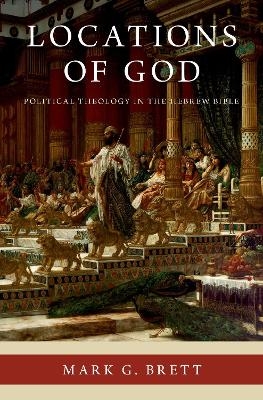
Locations of God
Political Theology in the Hebrew Bible
Seiten
2019
Oxford University Press Inc (Verlag)
978-0-19-006023-7 (ISBN)
Oxford University Press Inc (Verlag)
978-0-19-006023-7 (ISBN)
The Hebrew Bible is hardly what might be called a "unified" account of the national history of Israel. The texts, with their myriad genres and competing perspectives, show the forming and re-forming of Ancient Israel's social body in a number of geographical settings. The communities are shown in and out of political power. We read about in-fighting and peace, good kings and bad, freedom and subjugation. Ultimately, the Hebrew Bible is a text about nationhood and empire in the ancient world.
Critical reflection on the intersections of religious and political life -- which includes such topics as sovereignty, leadership, law, peoplehood, hospitality, redemption, creation, and eschatology -- can be broadly termed "Political Theology." In Locations of God, Mark G. Brett focuses primarily on the historical books of the Bible, comparing them with selected prophetic and wisdom books, setting all of them against the lived realities under the shadow of successive empires. Brett suggests that national ideas and their imperial alternatives were woven into the biblical traditions by authors who enjoyed very little in the way of political sovereignty. Using political theology to motivate the discussion, Brett shows us just how the earthly situation of ancient Israel contributed to its theology as reflected in the Hebrew Bible.
Critical reflection on the intersections of religious and political life -- which includes such topics as sovereignty, leadership, law, peoplehood, hospitality, redemption, creation, and eschatology -- can be broadly termed "Political Theology." In Locations of God, Mark G. Brett focuses primarily on the historical books of the Bible, comparing them with selected prophetic and wisdom books, setting all of them against the lived realities under the shadow of successive empires. Brett suggests that national ideas and their imperial alternatives were woven into the biblical traditions by authors who enjoyed very little in the way of political sovereignty. Using political theology to motivate the discussion, Brett shows us just how the earthly situation of ancient Israel contributed to its theology as reflected in the Hebrew Bible.
Mark Brett is a Professor of Hebrew Bible at Whitley College, the University of Divinity, in Melbourne, Australia. His recent books include Political Trauma and Healing: Biblical Ethics for a Postcolonial World and Decolonizing God: The Bible in the Tides of Empire.
| Erscheinungsdatum | 29.09.2019 |
|---|---|
| Verlagsort | New York |
| Sprache | englisch |
| Maße | 218 x 142 mm |
| Gewicht | 454 g |
| Themenwelt | Religion / Theologie ► Christentum ► Gebete / Lieder / Meditationen |
| Religion / Theologie ► Christentum ► Kirchengeschichte | |
| ISBN-10 | 0-19-006023-9 / 0190060239 |
| ISBN-13 | 978-0-19-006023-7 / 9780190060237 |
| Zustand | Neuware |
| Informationen gemäß Produktsicherheitsverordnung (GPSR) | |
| Haben Sie eine Frage zum Produkt? |
Mehr entdecken
aus dem Bereich
aus dem Bereich
Andachten über Losung und Lehrtext
Buch | Hardcover (2023)
Aue (Verlag)
CHF 26,90
Buber, Martin – Logik und Ethik – 14171
Buch | Softcover (2021)
Reclam, Philipp (Verlag)
CHF 11,90
Einführung in die Hymnologie
Buch | Hardcover (2023)
Vandenhoeck & Ruprecht (Verlag)
CHF 81,90


